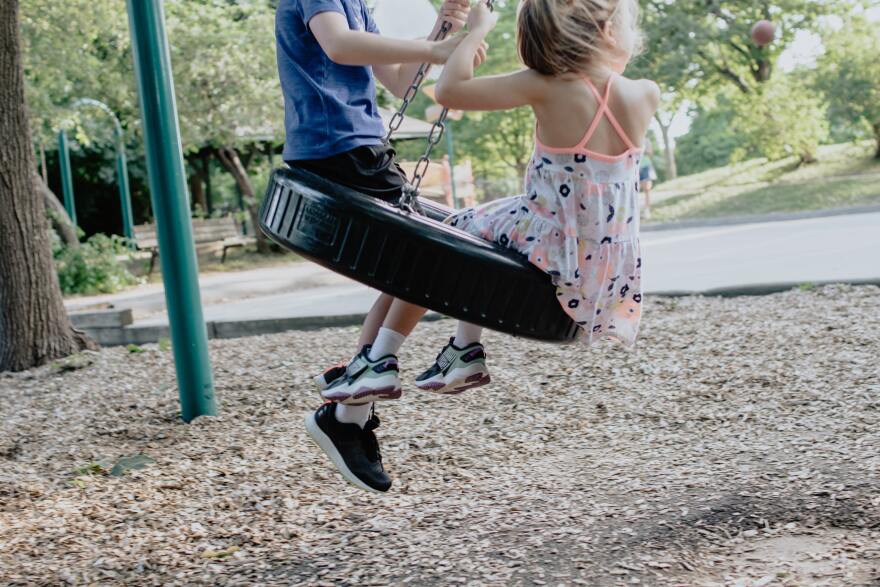I don’t know how my elementary school teachers kept us focused on schoolwork those last school days in June. Even I, the great grades/teacher’s pet, (yes, I was that kid), would stare out the classroom window, dreaming of riding my bike and playing with my friends every day, not having to rush back in time to finish homework. I couldn’t wait for endless games of tag, dodge ball, and hide-and-seek, (or frankly, the cooler, rougher, nightfall version I played with the neighborhood boys called ‘Relievio.’ What can I say? Boston kid, wicked competitive).
There were also pictures to paint, beach days with seashells to collect and, at least once a summer, an amusement park to visit. Oh, and lest I forget, one of my most favorite things to do was just lying on the grass, looking up at the clouds and daydreaming.
A number of composers decided to capture those moments and celebrate the joys of childhood. Maybe some of these pieces will jog your memory about your own playtime, flights of childhood imagination and moments of childhood joy.
Claude Debussy’s Children’s Corner was dedicated to his daughter, nicknamed Chouchou. He loved being a father and wrote this for her when she was three years old. The dedication read “To my dear little Chouchou with tender apologies from her father for what follows.” Each of the 6-movements had an English language title describing Chouchou’s favorite things, including “Serenade for the Doll,” “Jimbo’s Lullaby" (describing both her little toy elephant and Jumbo the elephant, who came from Africa and lived for a while in a botanic garden in Paris), and “Snow is Dancing.” Here’s Arturo Benedetti Michelangeli playing the whole suite.
Robert Schumann wrote his Kinderszenen (Childhood Scenes) in 1838, covering a wide range of children’s interests. There were 30 movements to start, but he pared it down to 13 for the final published version. Titles of the final pieces he chose included “Knight of the Hobbyhorse,” “Blind Man’s Bluff,” and “Happy Enough.” Perhaps one of the most famous of all of Schumann’s works was the seventh piece, “Träumerei” (Dreaming). Here’s Lars Roos playing it in concert
Ten years later Schumann went on to write a piano instruction book called Album for the Young for his three daughters. There were 43 pieces in all. The first 18 were clearly for children and beginners, with titles such as “Humming Song,” “Soldier’s March” and “The Happy Farmer,” and the final 24 are for more advanced students. Peter Tchaikovsky was so taken with Schumann’s Album that it inspired him to write his own in 1878, The Children’s Album, subtitled “24 simple pieces à la Schumann.” His pieces had titles such as “Morning Prayer,” “March of the Wooden Soldiers,” “The Sick Doll,” and “Playing Hobby-Horses.” Here's Lang Lang playing "Sweet Dreams" from that Suite, which was Tchaikovsky's equivalent of Schumann's "Träumerei."
Children’s Carnival by Amy Marcy Beach was written in 1894 as a six-movement collection of pieces for young children to play on the piano. It is said that because she had small hands herself it was easy for her to write pieces that children could play. Most of the movements have titles that were names of famous Renaissance-era marionettes such as “Harlequin,” “Columbine,” and “Pierrot and Pierrette.” The suite begins with a lighthearted walk, “Promenade.”
A few years later, in 1897, Beach wrote Children’s Album. This was a five-movement piece consisting of dances that children would have known, or at least would have heard about, such as “Minuet,” “Waltz,” and “Polka.” Here’s the “Gavotte,” played by Kirsten Johnson.
When Edward Elgar was a child he wrote tunes to use for a play he and his siblings staged for their parents. Some of the pieces were dances (“Sun Dance,” “Minuet”), and some were more atmospheric to “set the stage” literally. Forty years later, Elgar used those childhood songs for his two Wand of Youth Suites. Here’s “The Tame Bear” with William Boughton conducting the English String Orchestra.
Georges Bizet wrote a 12-movement ode to childhood playtime called Jeaux d’enfants (Children’s Games) in 1871. The movements touch on so many play time diversions we recognize today, such as “The Swing,” “The Spinning Top,” “The Doll,” “Soap Bubbles” and “Leap Frog.” Here is Enrique Bátiz conducting the Mexico City Philharmonic Orchestra in “Galop/The Ball,” where you can just picture kids running after a ball that escaped.
Gabriel Fauré wrote the Dolly Suite between 1893 and 1896. It was a series of pieces for piano duet that celebrated the special events in the life of the child (Dolly) of his mistress, Emma Bardac. It is said that Fauré would write a piece of music for the child’s birthday, for example, and send it off to her, one by one. The six short pieces include “Mi-a-ou” (not a cat’s meow, as many speculated, but rather the way little Dolly mispronounced her older brother Raoul’s name), “Le Jardin de Dolly,” (Dolly’s garden), and “Kitty-valse,”(again, nothing to do with a cat, but actually about Dolly’s pet dog, Ketty. Here are sisters Katia and Marielle Labeque playing the first piece, “Berceuse,” (cradle song).
An arrangement for orchestra was made in1906. Here’s Sir Thomas Beecham and the French National Radio Orchestra playing the full suite.
I hope these sweet pieces will be shared with a child in your life, including your own “inner child.” There’s nothing like connecting again with optimistic childhood feelings of wonder and simple joy.
CODA: Here’s a surprise! Shakespeare’s tragedy Othello doesn’t sound like a story in which to play music for children, but Samuel Coleridge-Taylor did it beautifully. Here’s the “Children’s Intermezzo,” which evokes childhood innocence, from his 1909 Othello Suite, with Adrian Leaper conducting the RTE Concert Orchestra.



